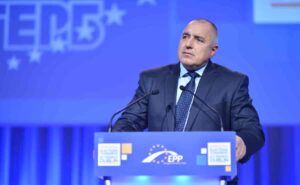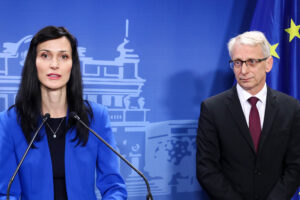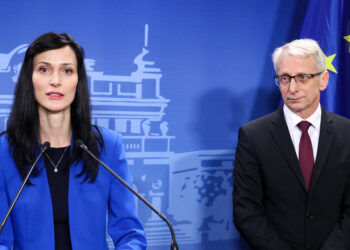Brussels – By now, the real news in Bulgaria would be about the stability of a government, if not even its formation. It did not take place, even after the outcome of the sixth early election in three years on June 9 in conjunction with the European elections, which delivered for the umpteenth time a fragmented political picture and the now well-known inability of Bulgarian parties to negotiate for the creation of a stable majority.

The proof this time comes from the populist right-wing of There is Such a People (ITN) – which
has just joined the European Conservatives and Reformists (ECR) group in the EU Parliament – and the decision of its leader, showman Slavi Trifonov to close the door on a government led by the conservative Gerb (Citizens for European Development of Bulgaria) party of former prime minister Boyko Borissov aiming to claim leadership of the Sofia executive. “ITN will not support a first or second term government, ” Trifonov announced in a post on Facebook Wednesday afternoon (June 19), thus ruling out support for either a Gerb-led cabinet or one taken over by the second force that emerged at the June 9 polls, the centrists of the Movement for Rights and Freedoms (DPS, part of the ALDE family of European liberals).

Trifonov, however, does not rule out the possible scenario of a Gerb-DPS-ITN majority – the only one possible at the moment in the National Assembly – saying that he expects the third mandate to form the government to be given by the President of the Republic, Rumen Radev, to his party: “We will propose an expert government to do certain and important things to the country for a fixed time. And if the mandate comes to us, I suggest that all political forces support such a government if they do not want us to go for elections in autumn,” he said, hinting at the specter of a seventh round of early elections in three and a half years. According to Bulgaria’s constitution, the President gives the first term to the largest political force in Parliament. If that fails, he must hand the second term to the second largest force, and if that also fails, he can personally decide to which party to hand over the last attempt, regardless of the number of deputies.
In the June 9 elections, ITN won only 5.96 percent of the vote and came in sixth place. However, its 16 elected members of parliament are decisive for the Gerb and DPS understanding in giving light to a majority (together, they stop at 115 seats, six short of the minimum threshold). So far, the Gerb leader and former Prime Minister Borissov always rejected the idea of ceding the government (he too is threatening to return to early elections). However, yesterday’s (June 20) political developments in the National Assembly show there may still be room for dialogue. Despite the halt to the formation of the Gerb-led government, ITN populists endorsed the Conservatives’ candidate for the Speaker of Parliament, Raya Nazaryan, thus avoiding an initial crisis in the possible new majority. “Nazaryan’s election gives the green light to constitutional procedures. We are focusing on the first term, which is the only possible one,” Borissov said, not helping to diminish the risk of yet another return to the polls.
Three years of political instability in Bulgaria
With the government agreement between Gerb and We Continue the Change in May 2023, the political instability that led the country to hold five elections in two years seemed to be over. It all started with the outcome of the polls on April 4, 2021, which confirmed the conservatives as the leading force in a highly fragmented political landscape. After three months of failed negotiations to form an executive, President Radev decided to hold early elections. Anti-system propaganda rewarded the There is Such a People populist movement, founded by showman Trifonov in the July 11 elections. After another four months of unsuccessful negotiations between the parties, President Radev was forced to call new early elections for November of that year.

On November 14, 2021, a quarter of the preferences went to the anti-corruption Let’s Continue Change party, bypassing Gerb’s conservatives and relegating Trifonov’s populists to the shadows. With the support of these two forces, Kiril Petkov was appointed Premier for the first time with a sense of stability and planning for the country’s future. Under his leadership, he pursued talks with North Macedonia to overcome the identity dispute blocking the opening of negotiations for Skopje’s accession to the EU since December 2020. It was a fatal move for Petkov, even though it did not prevent him from revoking the veto. First, Trifonov’s party switched to the opposition, and then, on June 22, 2022, there was a no-confidence motion against the government filed by Gerb.
After a round of inconclusive consultations, it was back to voting in October, with the former Prime Minister Borissov coming in first but with the usual inability to reach a governing agreement between the parties. The last elections, on April 2, 2023, confirmed the now chronic political gridlock: the two most established formations each won around 25 percent of the vote, with the pro-Russian and anti-European nationalists of Vazrazhdane on the rise. For this reason, the more experienced politician at the European level, Mariya Gabriel, was called in and – despite the great difficulty in reaching an agreement between the first and second political forces – the risk of sliding into pro-Russian and anti-European chaos at the new elections convinced both parties to accept a compromise, represented by the alternation to the office of Premier and Deputy-Premier over the 18 months of government. With the new government sworn in on June 6, 2023, Denkov immediately took over the role of Prime Minister and Gabriel that of Deputy Prime Minister and Foreign Minister, which they were to exchange in the spring, before the sudden collapse and the new return to the polls.
English version by the Translation Service of Withub







